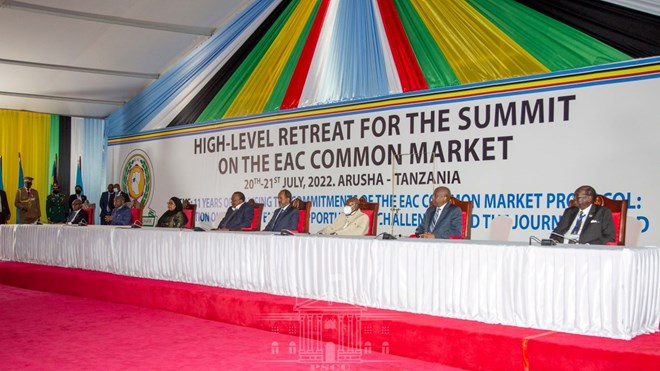By Abdullahi Ali Hassan
Wednesday July 27, 2022

The newly elected president
of the Somali Federal Government of Somalia, Hassan Sheikh Mohamud attended the
22nd East African Community (EAC) summit held, on 21tst
– 23rd July 2022, in Arusha
Tanzania, to renew an application of membership to the EAC bloc
that Somalia made in 2012. The EAC, a
regional intergovernmental organization, was founded in 1967 by then three
heads of states: Julius Nyerere of Tanzania, Mzee Jomo Kenyatta of Kenya,
Milton Obote of Uganda. The bloc was dissolved in 1977 and was reestablished in
1999, contains seven countries: Tanzania, Uganda, Kenya, Rwanda, Burundi, South
Sudan, and the DR Congo which recently joined.
Regional economic blocs are instrumental in advancing
the economies of member states. Europe with its advanced and mechanized economies
formed the regional organization of the European Economic Community (EEC) to
create common markets and customs in 1957 with a treaty signed by six
countries: France, Belgium, Netherland, West Germany, Luxemburg, and Italy. The
EEC evolved to the current European Union (EU). East Africa Community represent
member states faced with multiple developmental challenges rooted in “technological
underdevelopment and organizational incompetence’. It should be more natural for the weak to work
together than for the strong.
Some
see the EAC as an organization built on a bond of common heritage of formerly
British colonized English and Kiswahili speaking founding member states of Uganda,
Kenya and Tanzania.
Thus, to support his case, President Mohamud reiterated
to the summit that “Somali
belongs to East Africa. There is no one country sitting among the seven
countries sitting here that Somalia is not linked to, by business, by community”. President Mohamud’s comments relevantly draw attention
to the embeddedness of Somalis, entrepreneurial Somalis, across East Africa and
their contribution to the economic well-being in the communities they work.
However, one should expand the Presidents’ comment to explain the existing historical
linkages of Somalis with the peoples of the member states of EAC which include
language and culture. Research evidence shows that culture among
coastal communities of Warsheikh, Mogadishu, Merca and Baraawe, for instance,
is closely intertwined with that of communities of Kenyan and Tanzanian cities
such as Mombasa and the island of Zanzibar.
In fact, several coastal communities in Southern
Somalia speak Kiswahili as a mother tongue. The Bravanese Somali community in
Bravo speak Chimini, a northern dialect of Kiswahili is one of such community. Another
example is the Bajuni Somali community settled in in the small Indian Ocean
islands of Chulo, Chovaye, Koyama and other areas of Jubbaland who also speak,
a Bajuni- northern dialect of Kiswahili.
These shared culture and language of East African
coastal communities is found in the career of Asha
Abdow Malaika, the Somali singer, known as the Queen of Somali/ Kiswahili songs.
She creatively blended Somali and Kiswahili songs which was admired by
communities across East Africa and as well as the diaspora.
In addition to
ethnic Somali Kenyans in the North Eastern region known as the NFD, Somali communities settled in
Nairobi, Eastleigh since the early 20th century.
Somalis were part of early founding communities of the City of Nairobi. Eastleigh
became synonymous with Somalis thus it was dubbed as the ‘Little Mogadishu’.
On the business and economic front, Somalis have
contributed to transforming East African cities by investing in local
businesses. In the 1990s many Somalis who fled anarchy in Somalia settled in
Nairobi and converted Eastleigh ‘Little Mogadishu’, then a
residential suburb of Nairobi, into a bustling business zone. They established
various business enterprises including export and import networks, and erected
malls, lodges, and restaurants.
In
Uganda, there is a flourishing Somali business community. Amina Hersi Moghe is
a notable Somali businesswoman who invested multi-millionaire projects in
Kampala.
The
heads of States of the member states of EAC noted that the verification process
of Somalia’s request was not properly handled yet thus directed the EAC Ministerial
Council to expedite the process.
Somalis share historical rich and diverse common
experiences, which include culture and the Kiswahili itself, factors that can
be leveraged on to build trust and networks for businesses and trade, with
other East Africans.
Admitting Somalia to the East African Community will,
ideally, increase the movement of goods, services, and people across the bloc
to expand its gross of domestic production (GDP), and encourage the already
established Somali businesses across the region. Also, with its long Indian
Ocean± Red Sea route that link Africa to the Arabian Peninsula, a significant
economic zone, and the rest of Asia by extension, Somalia can be a gateway to
international trade.
Abdullahi Ali Hassan
[email protected]